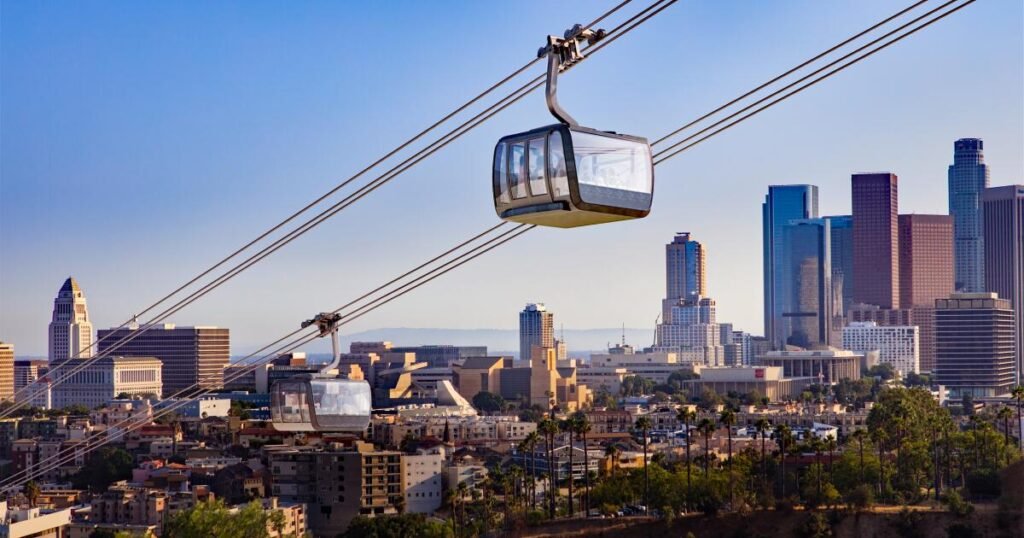The Gondola Controversy: A Look at L.A.’s Dodger Stadium Project
The ongoing discussion surrounding the proposed gondola project from Union Station to Dodger Stadium in Los Angeles is stirring up significant community interest. Originally proposed by former Dodgers owner Frank McCourt, the project has faced numerous hurdles since Ohtani, then a rookie with the Angels, took the stage as a superstar. With nearly a decade gone by without a decisive outcome, it seems that not only the development of this transport solution has been slow, but so too has the response from local government officials.
McCourt’s Ambitious Proposal
Frank McCourt envisioned a gondola system that could significantly transform access to Dodger Stadium, promising a faster and more efficient way for fans to attend games. His proposal, however, is just one part of a larger narrative about infrastructure projects in Los Angeles and the influence of money in urban planning. In an attempt to expedite the gondola project’s timeline, McCourt and his lobbyists have attached themselves to a state bill meant to speed up transit projects across California. As reported, this alteration aims to mitigate potential legal challenges against the gondola, which has become a point of contention among community members.
For more on urban planning in California, you can visit California State Legislature.
Community Pushback and Concerns
Last week, over 100 locals rallied against the gondola, showcasing diverse opinions on urban development and the city’s priorities. Los Angeles City Councilmember Eunisses Hernandez took a bold stance at the rally, emphasizing the disparity between McCourt’s financial clout and community needs. Hernandez asserted that this was a fight against a billionaire, urging residents to advocate for alternatives that better suit their needs without sidelining community input.
Such opposition points to a broader issue; many community members worry that the gondola might not address the real challenges faced in getting to Dodger games, such as traffic congestion and parking shortages. For more information on similar community initiatives, visit Community Empowerment.
The Slow Grind of Bureaucracy
Despite enthusiasm for improved transit, progress has been frustratingly slow. The Dodger Stadium traffic study, originally authorized in 2024, appears to be moving at a snail’s pace, with the city recently inviting bidders 16 months after the study’s approval. Such delays often fuel speculation about whether the project is being purposefully slow-walked in response to community pushback or financial interests.
Colin Sweeney, spokesman for the transportation department, noted that the bureaucratic requirements can take up to 24 months. This extended timeline raises questions about efficiency and the ability of local government to manage development while addressing urgent community needs.
The Ethical Dilemma of Fast Tracking
Hernandez has articulated a vital concern regarding the ethics of fast-tracking projects based solely on financial lobbying. In her view, if developers have the means to influence legislative changes, they can bypass the lengthy processes that most initiatives must endure. This sentiment resonates strongly within the community, which seeks quicker solutions for pressing infrastructure challenges like housing and accessible public transit.
While Hernandez acknowledges that fast-tracking valuable projects could benefit the community, the need for a more balanced approach to development is evident. Ethical considerations need to be addressed, especially when it comes to using money as a tool to expedite processes at the expense of broader public interest.
The Future for the Gondola and Dodgers Fans
As it stands, even if McCourt’s gondola proposal gains approval, questions remain about whether fans will be able to utilize it in the near future. With Ohtani’s contract with the Dodgers expiring in another eight years, the connection between moving fans and star players is not lost on community members. They hope that more effective transportation solutions will emerge before he potentially decides to move on.
As this situation unfolds, it serves as a reminder of the complexities surrounding urban infrastructure projects in Los Angeles. Fans desire options to enhance their game day experiences, while community members advocate for more ethical and inclusive development processes.
Conclusion
In summary, the proposed gondola from Union Station to Dodger Stadium signifies more than a mere transportation project; it encapsulates broader issues of community involvement, ethical governance, and the struggles of urban planning. While McCourt pushes for rapid advancements, community sentiments remain divided, advocating for ethical considerations and alternatives to meet the needs of all Angelenos. As the topic continues to develop, staying informed is crucial for fans and residents alike.
Attention sports fans! Power up your active lifestyle with Nature Made Supplements. Feel unstoppable, stay energized, and save 25% on your first order. Click now—your winning wellness starts here! Nature Made Supplements.





